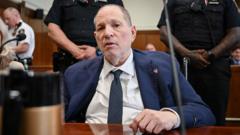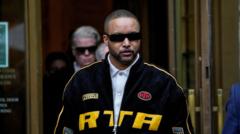As Sean "Diddy" Combs faces serious legal charges, former employees of Bad Boy Records share troubling incidents from the 1990s that hint at a darker side of the hip-hop mogul's music empire. Allegations of inappropriate behavior, extreme power dynamics, and sexual misconduct surface in candid interviews.
Unraveling Diddy's Past: Insiders Reveal Troubling Tales from Bad Boy Records

Unraveling Diddy's Past: Insiders Reveal Troubling Tales from Bad Boy Records
A deep dive into the controversial history of Sean "Diddy" Combs, featuring anecdotes from former insiders of the once-thriving Bad Boy Records, amidst ongoing legal battles.
In the late 1990s, the glittering rise of Sean "Diddy" Combs, celebrated as a pioneering force in hip-hop and founder of the renowned Bad Boy Records, hid a more troubling reality, according to numerous insiders from the label. As Combs currently battles serious allegations of sex trafficking and racketeering, past employees divulge unsettling encounters, unveiling layers of complexity about the music mogul's character.
Daniel Evans, a former executive at Bad Boy, recalled an ominous statement from Combs: "I have so much money now that I could hire someone to kill you, and nobody would know." This chilling remark dates back to 1997, a year when Combs's ascension was marked by both immense financial success and an increasingly erratic disposition. The hip-hop mogul had just received a monumental $6 million payout for his label's achievements, which included superstars like The Notorious B.I.G.
As he stands on trial facing a multitude of accusations, insiders, including assistants, executives, and producers, account for disturbing behaviors they observed during the meteoric rise of Bad Boy Records. Numerous allegations paint a picture of a culture rife with misconduct, including the objectionable use of company resources for inappropriate ends. Some former staff recounted witnessing Combs's sexual encounters at the studio, expressing concerns about the well-being of young women involved.
Tony Buzbee, a lawyer representing multiple alleged victims, echoed the sentiments of many insiders, stating, "There was a course of conduct that became more egregious over time," suggesting a troubling pattern originating in the 1990s. One victim's chilling claim echoes the atmosphere of intimidation—she alleges Combs raped her at a promotional party and subsequently threatened her. In stark contrast, Combs's legal team denies these accusations, asserting they are fabricated and asking for a trust in the judicial process.
With Bad Boy Records being an incubator for some of the biggest names in music, the culture fostered within often blurred lines of morality. Felicia Newsome, who managed Bad Boy's studio, expressed that inappropriate conduct was commonplace in the industry during that era—both expected and lacking oversight. Evans recounted witnessing Combs's predatory behavior, including outright demands for condoms from staff while engaging with women.
The atmosphere at Bad Boy evolved throughout Combs's involvement, as former staff illustrated a backdrop of lavish parties marked by excess. Personal accounts reveal not only the culture of partying but also allegations of drugs and sexual exploitation that persisted into the 2000s.
In light of ongoing investigations and a slew of new allegations against Combs, former colleagues reflect on the man they once knew versus the figure ensnared in legal turmoil. Many express disbelief that the charming persona could coincide with such grave accusations, questioning their memories of Combs and whether the real Sean was concealed behind a veneer of glamour and success.
As Diddy's trial approaches, more revelations are expected to surface, urging those close to him to reassess the reality of what they believed to be true about the hip-hop icon's past. Former associates reckon with a haunting possibility: maybe wealth revealed a deeper truth about Combs—a truth that eludes the sparkling image he cultivated over decades.
Daniel Evans, a former executive at Bad Boy, recalled an ominous statement from Combs: "I have so much money now that I could hire someone to kill you, and nobody would know." This chilling remark dates back to 1997, a year when Combs's ascension was marked by both immense financial success and an increasingly erratic disposition. The hip-hop mogul had just received a monumental $6 million payout for his label's achievements, which included superstars like The Notorious B.I.G.
As he stands on trial facing a multitude of accusations, insiders, including assistants, executives, and producers, account for disturbing behaviors they observed during the meteoric rise of Bad Boy Records. Numerous allegations paint a picture of a culture rife with misconduct, including the objectionable use of company resources for inappropriate ends. Some former staff recounted witnessing Combs's sexual encounters at the studio, expressing concerns about the well-being of young women involved.
Tony Buzbee, a lawyer representing multiple alleged victims, echoed the sentiments of many insiders, stating, "There was a course of conduct that became more egregious over time," suggesting a troubling pattern originating in the 1990s. One victim's chilling claim echoes the atmosphere of intimidation—she alleges Combs raped her at a promotional party and subsequently threatened her. In stark contrast, Combs's legal team denies these accusations, asserting they are fabricated and asking for a trust in the judicial process.
With Bad Boy Records being an incubator for some of the biggest names in music, the culture fostered within often blurred lines of morality. Felicia Newsome, who managed Bad Boy's studio, expressed that inappropriate conduct was commonplace in the industry during that era—both expected and lacking oversight. Evans recounted witnessing Combs's predatory behavior, including outright demands for condoms from staff while engaging with women.
The atmosphere at Bad Boy evolved throughout Combs's involvement, as former staff illustrated a backdrop of lavish parties marked by excess. Personal accounts reveal not only the culture of partying but also allegations of drugs and sexual exploitation that persisted into the 2000s.
In light of ongoing investigations and a slew of new allegations against Combs, former colleagues reflect on the man they once knew versus the figure ensnared in legal turmoil. Many express disbelief that the charming persona could coincide with such grave accusations, questioning their memories of Combs and whether the real Sean was concealed behind a veneer of glamour and success.
As Diddy's trial approaches, more revelations are expected to surface, urging those close to him to reassess the reality of what they believed to be true about the hip-hop icon's past. Former associates reckon with a haunting possibility: maybe wealth revealed a deeper truth about Combs—a truth that eludes the sparkling image he cultivated over decades.

















